HYBRID PROGRAM — in-person at the Emily Dickinson Museum AND streaming live for online registrants
This program is FREE to attend. Registration is required.
Part of the 2025 Tell It Slant Poetry Festival!
Join us for the 13th annual Tell it Slant Poetry Festival, a week of events happening both online and in-person at the Museum! Register here to access the Festival schedule:
REGISTER FOR THE FESTIVAL
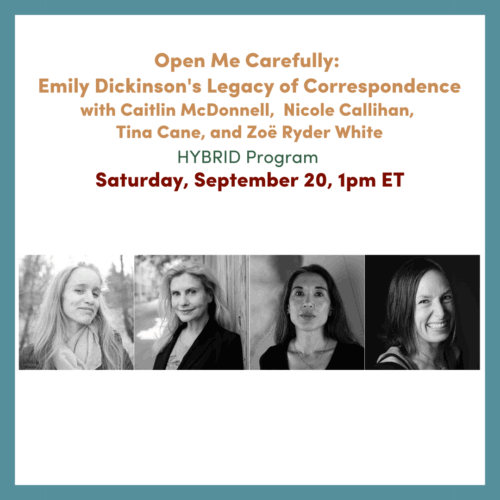 Emily Dickinson is known to have written more than a thousand intimate and poetic letters in her lifetime. What fueled these correspondences, and how did these correspondences fuel Dickinson’s creative mind? In this workshop, poets Nicole Callihan, Tina Cane, Caitlin Grace McDonnell, and Zoë Ryder White will discuss the necessity and ascendancy of correspondence in their own lives and work. Panelists will consider poetry’s deep intersection of private world and public sphere, and then ask participants to do the same as they pen their own letter-poems. This generative writing—if Nerve not be denied!—will be shared.
Emily Dickinson is known to have written more than a thousand intimate and poetic letters in her lifetime. What fueled these correspondences, and how did these correspondences fuel Dickinson’s creative mind? In this workshop, poets Nicole Callihan, Tina Cane, Caitlin Grace McDonnell, and Zoë Ryder White will discuss the necessity and ascendancy of correspondence in their own lives and work. Panelists will consider poetry’s deep intersection of private world and public sphere, and then ask participants to do the same as they pen their own letter-poems. This generative writing—if Nerve not be denied!—will be shared.
Caitlin Grace McDonnell, a former New York Times Foundation and Fine Arts Work Center fellow, has published two books (Looking for Small Animals 2012 and Pandemic City 2021, both from Nauset Press) and a chapbook (Dreaming the Tree 2003 from belladonna). Her poems and essays have been widely anthologized, most recently in Braving the Body (2024) and Poetry is Bread (upcoming). She teaches writing and lives in Brooklyn with her daughter.
Nicole Callihan, winner of the 2023 Tenth Gate Prize and a 2023 Alma Award, has two recent poetry collections: chigger ridge (The Word Works 2024) and SLIP (Saturnalia 2025). Other books include This Strange Garment (Terrapin 2023), as well as the chapbooks Downtown, A Study in Spring, and ELSEWHERE (the latter two in collaboration with Zoë Ryder White). Nicole also co-edited the Braving the Body anthology published by Harbor Editions in March 2024.
Tina Cane is the founder/director of Writers-in-the-Schools, RI, and served as Poet Laureate of Rhode Island (2016-2024). A 2020 fellow with the Academy of American Poets, Cane is the author of The Fifth Thought, Dear Elena: Letters for Elena Ferrante, Once More With Feeling, Body of Work, and Year of the Murder Hornet. Creator/curator of the distance series Poetry is Bread, and editor of Poetry is Bread: The Anthology, Cane has also published two verse novels for younger readers, Alma Presses Play and Are You Nobody Too? (Penguin/ Random House).
Zoë Ryder White’s poems have appeared in Tupelo Quarterly, Iterant, Plume, and Threepenny Review, among others. Her first full-length collection, The Visible Field, is forthcoming from River River Books in early 2026. A chapbook, Via Post, was a finalist for Tupelo Press’ Snowbound Chapbook award and won the Sixth Finch chapbook contest in 2022. HYPERSPACE was the editors’ choice pick for the Verse Tomaž Šalamun Prize in 2020 and is available from Factory Hollow Press. She co-authored A Study in Spring and Elsewhere with Nicole Callihan. A former elementary school teacher, she edits books for educators about the craft of teaching.
Support The Tell It Slant Poetry Festival and Honor Someone Special:
Admission to all Festival events is free, but online donations, especially those made in honor or memory of family, friends, or colleagues are heartily encouraged and vital to the future of this beloved annual event. All gifts are tax deductible and will be recognized as part of the Festival.
2025 Tell It Slant Poetry Festival Schedule
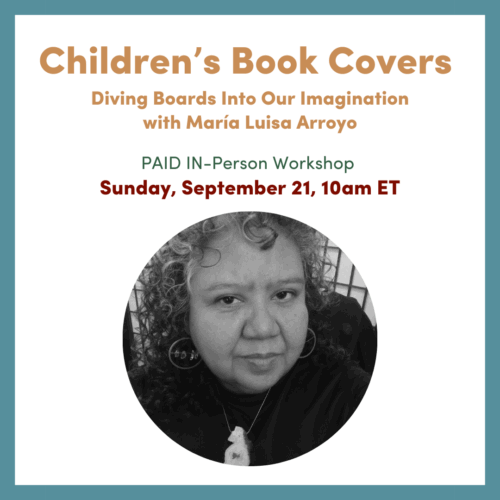 Beginner and experienced poets of all ages are invited to come and use children’s book covers as diving boards into memory and imagination. Children’s books will be on hand to browse, and participants will also be encouraged to search online for their own current or past favorite children’s books. Using one or more of the five senses (sight, sound, touch, smell & taste), participants will generate drafts of new poems as the vivid literary landscape of rhymes, illustration, and stories of childhood spark memories and new ideas.
Beginner and experienced poets of all ages are invited to come and use children’s book covers as diving boards into memory and imagination. Children’s books will be on hand to browse, and participants will also be encouraged to search online for their own current or past favorite children’s books. Using one or more of the five senses (sight, sound, touch, smell & taste), participants will generate drafts of new poems as the vivid literary landscape of rhymes, illustration, and stories of childhood spark memories and new ideas. 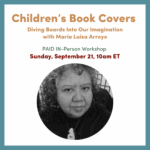
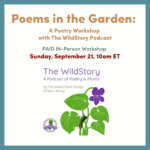
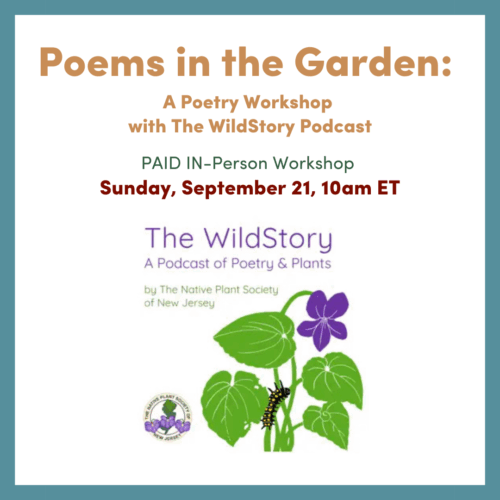 In a time of ecological crisis and increased disconnection from nature, poets create vital space to honor and reflect upon the natural world, with its joys and its losses. In this generative workshop led by The WildStory Podcast host Ann E. Wallace and featured guest Elizabeth Sylvia, poetry and nature enthusiasts of all ages and experience levels are invited to slow down and open their senses to the natural world—the memories it holds, the meanings it carries, and the feelings it inspires. Participants will engage in writing exercises, learn new strategies, and compose a poem draft during the session.
In a time of ecological crisis and increased disconnection from nature, poets create vital space to honor and reflect upon the natural world, with its joys and its losses. In this generative workshop led by The WildStory Podcast host Ann E. Wallace and featured guest Elizabeth Sylvia, poetry and nature enthusiasts of all ages and experience levels are invited to slow down and open their senses to the natural world—the memories it holds, the meanings it carries, and the feelings it inspires. Participants will engage in writing exercises, learn new strategies, and compose a poem draft during the session.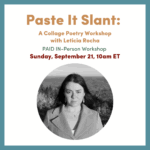
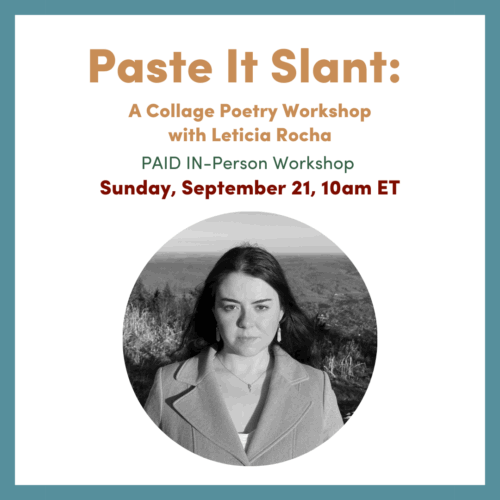 Join us for a generative workshop that pairs the visual art form of collage with poetry! Participants will be guided through a process of discovery with different collaging materials and text to create their own hand-crafted collage. You will walk away with seeds of poems, deeper knowledge and experience with a visual art form, and a found poetry technique to help you — in the immortal words of Emily Dickinson — “tell all the truth but tell it slant “! All levels of experience with poetry and visual art are welcome.
Join us for a generative workshop that pairs the visual art form of collage with poetry! Participants will be guided through a process of discovery with different collaging materials and text to create their own hand-crafted collage. You will walk away with seeds of poems, deeper knowledge and experience with a visual art form, and a found poetry technique to help you — in the immortal words of Emily Dickinson — “tell all the truth but tell it slant “! All levels of experience with poetry and visual art are welcome.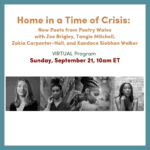
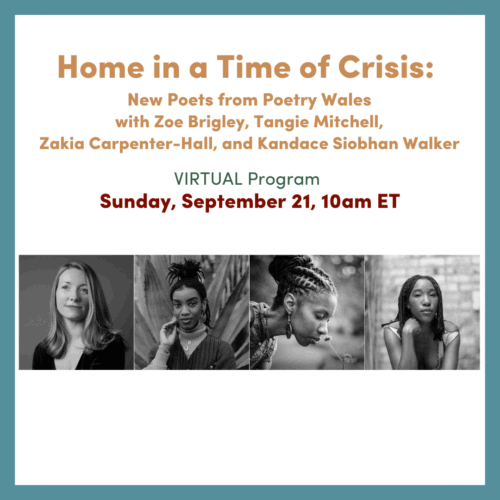 Where do we find home, belonging and comfort in a time of crisis? What might Emily Dickinson tell us about how to find comfort and strength when it sometimes feels like nothing we do can change things for the better? Head editor and chair Zoë Brigley presents three brilliant new editors from the magazine Poetry Wales: Kandace Siobhan Walker, Tangie Mitchell and Zakia Carpenter-Hall. These rising poetry stars will talk about where they find comfort, reading classic poems such as “Hope” is the thing with feathers’ alongside less well known Dickinson poems and their own work.
Where do we find home, belonging and comfort in a time of crisis? What might Emily Dickinson tell us about how to find comfort and strength when it sometimes feels like nothing we do can change things for the better? Head editor and chair Zoë Brigley presents three brilliant new editors from the magazine Poetry Wales: Kandace Siobhan Walker, Tangie Mitchell and Zakia Carpenter-Hall. These rising poetry stars will talk about where they find comfort, reading classic poems such as “Hope” is the thing with feathers’ alongside less well known Dickinson poems and their own work.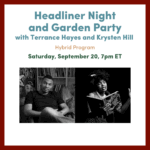
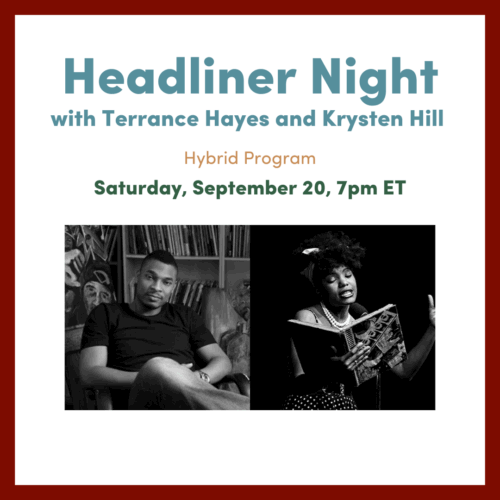 Join us in Emily Dickinson’s garden or virtually for a celebration of creativity and poetry! Our headlining poets, National Book Award and MacArthur Genius grantee Terrance Hayes and award-winning poet Krysten Hill, read from their work and discuss their poetic practice and inspiration with moderator Nicole Callihan.
Join us in Emily Dickinson’s garden or virtually for a celebration of creativity and poetry! Our headlining poets, National Book Award and MacArthur Genius grantee Terrance Hayes and award-winning poet Krysten Hill, read from their work and discuss their poetic practice and inspiration with moderator Nicole Callihan.
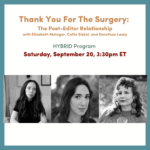
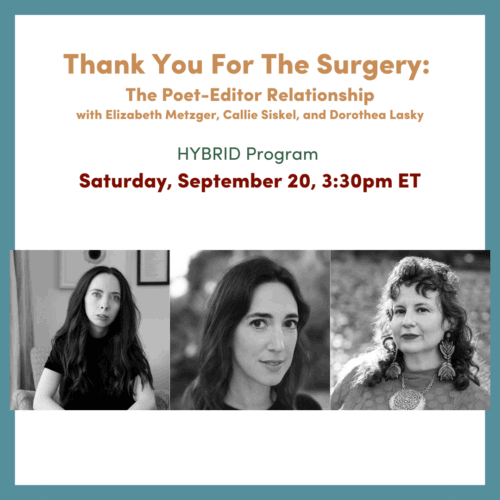 Callie Siskel and Elizabeth Metzger, poetry co-editors at the Los Angeles Review of Books, and poet Dorothea Lasky, will use the Higginson-Dickinson correspondence to consider the role of the poet as editor or editor as poet today and rethink our assumptions about the editor. Beyond the aim of publishing our work as poets, how might we see the conversation between poet and editor today as expanding possible pathways of creativity? We often think about the relationship between poet and reader, but the special role of the poet-editor offers an intermediary process that has the opportunity to transform, elevate, or pressurize our solitary artistic visions–sometimes by offering concrete feedback, sometimes by asking us to formulate our aesthetic vision or reconsider our projects and values, and other times simply by creating space in our society for a larger conversation around poetry, life, and listening. In a poetry world in which many editors are poets themselves, and a main avenue for becoming a poet is the workshop classroom, how might the editor-poet relationship create a correspondence that is at once formative, supportive, and expansive, and a relationship that is personally and professionally meaningful and ideally non-hierarchical?
Callie Siskel and Elizabeth Metzger, poetry co-editors at the Los Angeles Review of Books, and poet Dorothea Lasky, will use the Higginson-Dickinson correspondence to consider the role of the poet as editor or editor as poet today and rethink our assumptions about the editor. Beyond the aim of publishing our work as poets, how might we see the conversation between poet and editor today as expanding possible pathways of creativity? We often think about the relationship between poet and reader, but the special role of the poet-editor offers an intermediary process that has the opportunity to transform, elevate, or pressurize our solitary artistic visions–sometimes by offering concrete feedback, sometimes by asking us to formulate our aesthetic vision or reconsider our projects and values, and other times simply by creating space in our society for a larger conversation around poetry, life, and listening. In a poetry world in which many editors are poets themselves, and a main avenue for becoming a poet is the workshop classroom, how might the editor-poet relationship create a correspondence that is at once formative, supportive, and expansive, and a relationship that is personally and professionally meaningful and ideally non-hierarchical?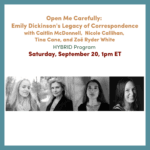
 Emily Dickinson is known to have written more than a thousand intimate and poetic letters in her lifetime. What fueled these correspondences, and how did these correspondences fuel Dickinson’s creative mind? In this workshop, poets Nicole Callihan, Tina Cane, Caitlin Grace McDonnell, and Zoë Ryder White will discuss the necessity and ascendancy of correspondence in their own lives and work. Panelists will consider poetry’s deep intersection of private world and public sphere, and then ask participants to do the same as they pen their own letter-poems. This generative writing—if Nerve not be denied!—will be shared.
Emily Dickinson is known to have written more than a thousand intimate and poetic letters in her lifetime. What fueled these correspondences, and how did these correspondences fuel Dickinson’s creative mind? In this workshop, poets Nicole Callihan, Tina Cane, Caitlin Grace McDonnell, and Zoë Ryder White will discuss the necessity and ascendancy of correspondence in their own lives and work. Panelists will consider poetry’s deep intersection of private world and public sphere, and then ask participants to do the same as they pen their own letter-poems. This generative writing—if Nerve not be denied!—will be shared.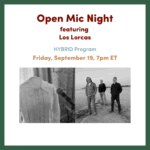
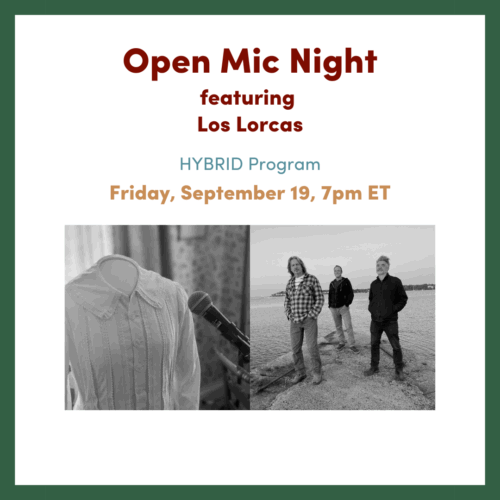
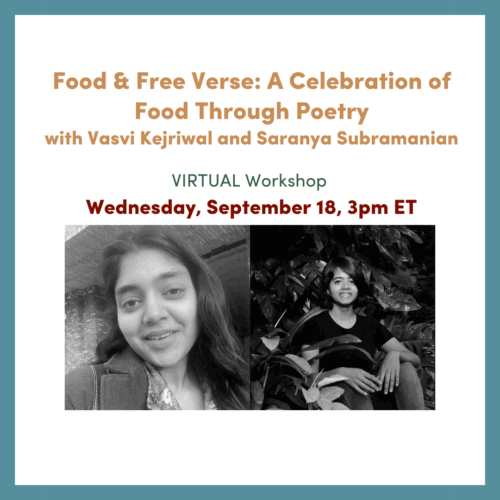 This is a unique poetry generative writing workshop for writers of all levels. We will meditate on different ways to perceive the way food nourishes the soul, just like a poem does: through memory and survival, through gratitude, through synesthesia, through love languages and through socio-economic commentary. Join us and leave with at least one solid poem draft!
This is a unique poetry generative writing workshop for writers of all levels. We will meditate on different ways to perceive the way food nourishes the soul, just like a poem does: through memory and survival, through gratitude, through synesthesia, through love languages and through socio-economic commentary. Join us and leave with at least one solid poem draft! 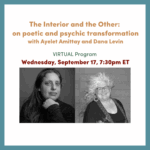
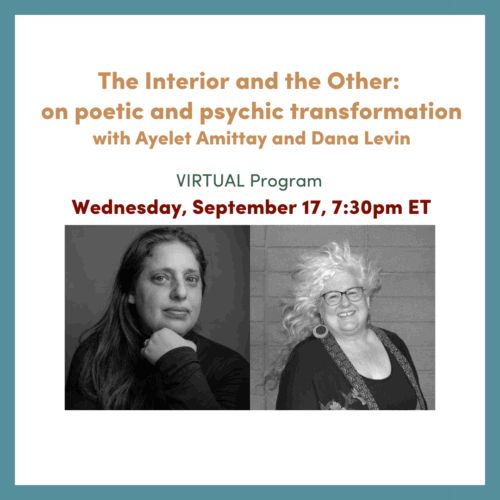 What can poetry teach us about psychoanalysis, and the process of sharing one’s inner self with another? What can therapeutic or healing work teach us about writing poems? In this panel, two poets who have written about and undergone forms of therapy will explore the art and practice of writing about interiority and healing. We will read Emily Dickinson, Louise Gluck, and each presenter’s work, and explore the intersections between them.
What can poetry teach us about psychoanalysis, and the process of sharing one’s inner self with another? What can therapeutic or healing work teach us about writing poems? In this panel, two poets who have written about and undergone forms of therapy will explore the art and practice of writing about interiority and healing. We will read Emily Dickinson, Louise Gluck, and each presenter’s work, and explore the intersections between them.